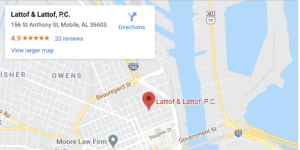What Are Economic Damages?

When you’re involved in an accident that’s not your fault you may be entitled to compensation from the party who injured you. The monetary compensation should cover the cost of your injuries and damage to your property, but it’s often more complicated than that. It might help to learn about economic damages and how they work.
Table of Contents
The Basics of Economic Damages in Alabama
Damages refer to monetary compensation a claimant receives in a civil case, like a personal injury claim. For example, if you were injured in a car accident and filed a civil suit against the person who caused the accident, you could receive damages if you win the case.
In Alabama, claimants in civil suits can receive economic or non-economic damages. Economic damages are usually the easiest to determine. They compensate for your financial losses after an injury, such as medical expenses and lost wages.
Typical Economic Damages in Alabama
Economic damages can cover many costs you incurred due to the incident in question. These seek to reimburse you for financial burdens due to an injury.
Some of the typical expenditures you can recover include:
- Past and future medical expenses, including hospital stays, x-rays, blood tests, and surgeries
- Cost of repairs or replacement of damaged property, like a car
- Loss of income, including future earning capacity
- Funeral expenses if a family member died as the result of an accident
Economic damages intend to return you to the financial position you were in before the accident. It’s helpful to keep detailed records of injury-related expenses. Keeping a file of medical bills, therapies, procedures, and your employment status can all help your case.
Calculating Economic Damages in Alabama
Calculating damages in personal injury cases can be complicated. However, economic damages are easier to determine since they can be documented.
To determine the total award, judges may consider:
- How much the claimant spent or owes for medical treatment related to their injuries
- All expenses related to therapy and rehabilitation
- Projected costs of continued and future healthcare related to the injuries
- How much work the claimant missed and the impact on future work prospects
- How much the defendant’s insurance policy covers for injury and property damage
Pursuing economic damages in car accidents and other personal injury cases gets challenging when you have to prove the defendant was solely responsible for your injuries.
Are You Entitled to Economic Damages?
To receive compensation for injuries sustained in an accident, you need to prove that somebody else (the defendant) was at fault.
Generally, you do this through a negligence lawsuit, which required you to prove four things:
- The defendant owed you a duty of care.
- The defendant failed to comply with that duty.
- The defendant’s failure caused damage to you and your property.
- You suffered damages from the accident.
For example, say you were in a car accident because somebody else was speeding and driving recklessly. Every driver has a duty to drive safely and responsibly. By getting behind the wheel, the defendant assumed that responsibility. You must also prove that they were speeding and driving recklessly.
Further, you must establish that the defendant’s speeding and reckless driving directly caused the accident and your injuries. Additionally, you must provide support for the financial losses related to the injuries.
Limitations to Economic Damages
When considering economic damages in Alabama, there are some limitations. First, you must file within a set time period. Second, you must account for Alabama’s contributory negligence rules.
In Alabama, the statute of limitations for a personal injury or negligence case is two years. The clock starts at the time of the accident, meaning you have to file a claim within two years of the accident date or lose your right to compensation.
Alabama also recognizes contributory negligence in personal injury cases. This doctrine bars you from recovering damages if you were partially at fault for your accident and injuries – even if you are only one percent responsible.
For example, consider the above example of the car accident. If the defendant can prove that you were also speeding, the judge may determine that you are partially at fault, which can bar you from recovering damages.
Given the complexities of economic damages and personal injury claims, you may want to retain experienced legal counsel to help you through the process. When you’re focused on recovering from injuries, it’s nice to have help organizing the components of your legal claim to get the best compensation for you.

